Turquoise
female vocal fronted progressive rock
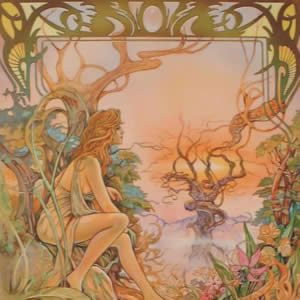 Turquoise (2001) Image © Ars Mundi 2001 |
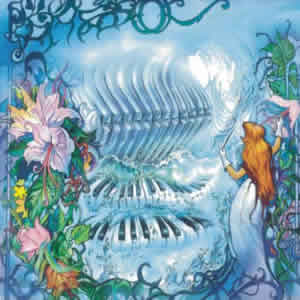 Po Drugiej Stronie (2003) Image © Ars Mundi 2002 |
album reviews
Reviews © Russell W. Elliot 2002-2003all images © Turquoise 2001-2003 | used with permission
Formatted for 800 x 600 or larger windows
Last updated: 27 February 2004
Turqoise is a five person progressive rock band from Poland who was brought to our editors' attention by the October edition of the Classic Rock Society magazine. With a sound not too distant from that of Poland's Quidam (Time Beneath The Sky review, other reviews) or Hungary's You And I (Exit review, other reviews), the debut album from Turquoise is certain to appeal to fans of 70s style progressive rock. The second album develops from there with more dramatic guitar riffs, a blend of male and female vocals and richer orchestral keyboard arrangements. Our reviews of their albums follows below. A 2002 interview with the original lineup published within this article was lost during an ISP outage in early 2003. If the original transcript requested from the band is recovered, we will republish that interview here.
The band's initial lineup (pictured in this article) is completed by Alexander Zelazny (guitar), Marek Sokól (keyboards), Marcin Zwonarz (percussion) and Sebastian Klus (bass). Damian Kurasz contributes electric guitar as a guest to several of the album's numbers. The material is full of lush keyboards, soaring guitar excursions, rhythmic and melodic bass and crisp percussion. The debut album opens with the accessible "Znak," a tune that elaborates on the band's style with acoustic and electric guitar parts perfectly supported by keyboards while underscoring Katrzyna's sweet, evocative and crystalline vocal delivery.
By the time of Po Drugiej Stronie (ARS Mundi (Germany) AMS 0333R, 2003) there were some changes in the Turquoise lineup. Vocals on are provided by Lilia Wojciechiwska, Agnieszka Dudek and Jacek Galant. Marcin Zonarz (percussion), Sebastian Klus (bass) and Alexander Zelazny (guitars) remain with the band. A variety of guest musicians also contributed to the release and include the former lead vocalist Katarzyna Jaiko amongst others.
 Sebastian Klus (bass) Image © Turquoise 2002 |
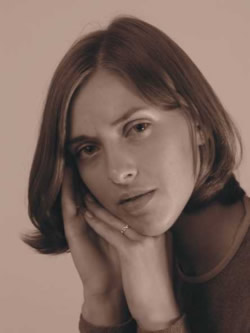 Katarzyna Jajko (vocals) Image © Turquoise 2002 |
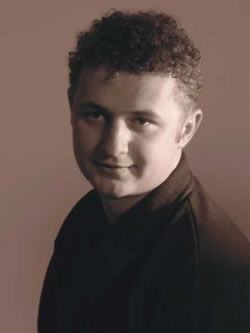 Marek Sokól (keyboards) Image © Turquoise 2002 |
Turquoise. The self-titled debut album by Turquoise (ARS Mundi (Germany) AMS 027R, 2001) is a cohesive project comprised of ten various length tracks, two of which would be classified as mini-epics. It will delight our listeners from first play. Production quality is superb with vocals mixed way above the instrumentals with near perfect imaging of the individual parts. All lyrics are sung in Polish. While there is no stated plan to release a version sung in English, the material sounds great in Katarzyna's native tongue similar to Emilia Derkowska's use of the language in Quidam's music.
We were especially pleased with Alexander's treatment of the guitar solos. In "Znak" allusions of uillean pipes emerged and these sounds were echoed to some extent in "Tesknota" but the solos are more notable and pronounced. An extended moody--almost middle eastern--instroduction with elaborate acoustic guitar, vocal layers and powerful percussion precedes the progressive instrumental "Dajemma." The transformation of the band's sound coming into the main part of the number and through the various movements clearly demonstrates the virtuousity of the individual players as well as the entire band. We were especially impressed with the dueling electric guitar / keyboard solos and vast instrumental excursions within the piece. Unfortunately it lacks a precise closing riff and fades out instead.
Layers of sweet vocals dominate the melody in "Odkrycie" a gentle progressive lullaby style ballad lushly arranged to demonstrate Turquoise's instrumental richness. An equally special electric guitar solo during the instrumental bridge will draw listeners' attention. A well played acoustic guitar, based upon traditional melodies from the region, sounding much like Blackmore's Night (review) dominates the gentle instrumental transition "Utrenja." The sound transitions well into "To Co W Nas (Spelnienie)" a gentle and progressive ballad graced with layers of Katarzyna's vocals supported by acoustic guitar arrangements while further instrumentals build with the energy of the tune.
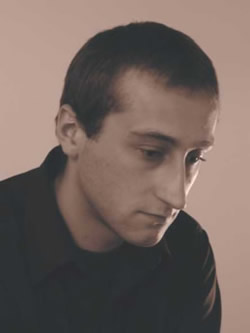 Marcin Zwonarz (percussion) Image © Turquoise 2002 |
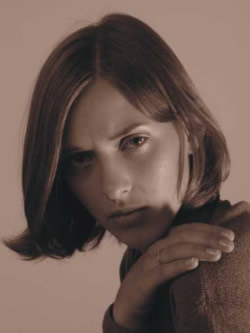 Katarzyna Jajko (vocals) Image © Turquoise 2002 |
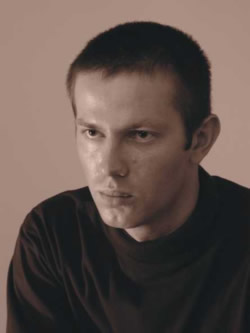 Alexander Zelazny (guitars) Image © Turquoise 2002 |
Further instrumental solo excursions during the bridges include lovely keyboard arrangements and a dramatic guitar solo reminscent in some ways of Bryan Josh with Mostly Autumn (review). But it is Katarzyna's lead vocal that carries the tune to listener ecstacy. The track "A Ja, A Ty" begins with a lovely light acoutistic guitar and Katarzyna's spoken word as the keyboard and bass arrangement builds the lushness of the tune. Clearly one of the album's standouts, listeners will find Katarzyna's vocals remarkable, especially the way they work so well with the symphonic progressive power of the instrumental arrangements. Keyboard solos during the instrumental bridge are superb and work extremely well with almost-metal edged guitar parts and ultra-crisp percussion. Turquoise is an extremely tight band it it comes out well during the solo sections of the bridge.
The first of the album's two mini-epics is entitled "Strach." Rhythmically arranged with layers of vocalise, crisp percussion and bass underscoring the lead vocal line, acoustic guitar plays an equally important role to the delivery. Listen for Katarzyna's voice to soar above the instrumentals both in the lead and the backing vocalise lines. The individual movements within the piece are separated by signficant transitions between them as different instruments--notably acoustic guitar--take control of the melody building towards the final crescendo and powerful instrumental.
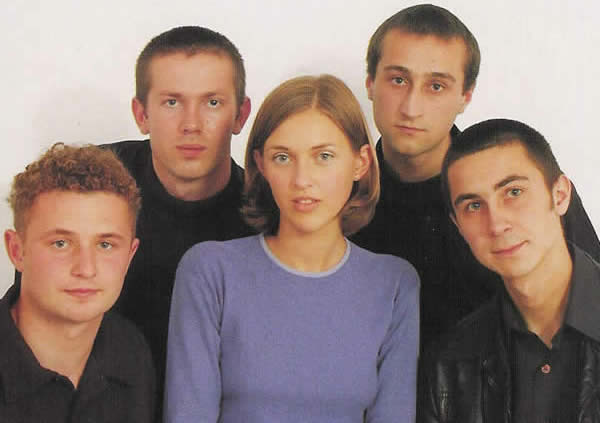 Marek Sokól, Alexander Zelazny, Katarzyna Jaijko, Marcin Zwonarz, Sebastian Klus The Original Turquoise Lineup (2001) |
The short instrumental introduction "Drzewa Umieraja Stojac" precedes the final epic and stunning closing track of the album entitled "Wez Zed Zobamnie." Rich keyboard textures bring out the symphonic progressive sound of Turquoise in full splendour while Katarzyna's vocals soar above the arrangement. Lyrical and vocalise parts alternate as the song develops. Here one will hear Katarzyna across her range and at full power, evocatively delivering the message within the tune.
Dueling electric guitars and crisp percussion are perfectly balanced by melodic keyboard during the instrumental bridge that precedes the thunder and rain. Melodious vocals and rich instrumentals return to conclude the number with Turquoise playing in full splendour. This must be a wonderful number to see performed in concert. Layers of Katarzyna's vocals dominate the arrangement with instrumentals clearly holding back providing just the necessary foundation to support the main melody. Electric guitar solos further illustrate Alexander's virtuoisity while Marek's keyboards deliver a soothing texture before the piece gives way to the ultimate acoustic guitar conclusion.
Po Drugiej Stronie. In addition to the natural evolution brought about through the lineup changes, Turquoise's second album is indeed a significant development for the band. While the most significant change is the blend of male vocals with the new female voices the short "Prolog" clearly shows their roots in 70s style orchestral keyboards. "Desiderata" is a folky art rock number rooted in the band's earlier sound with the lovely new female vocalists, acoustic guitar, light percussion and keyboards dominating the arrangement. Lilia's mid-range lead vocals are evocative and sensual atop acoustic guitar while Agnieszka's provide a lovely texture backing in the chorus against the richer arrangements. Guitar solos within the piece have more of a metal edge and provide insight on the direction the band are taking. All vocals are sung in Polish.
The band continues to illustrate their development with Jacek Galant's lead vocal in "Spotkanie," a melodic guitar-based romp. A good singer, his vocals appear to be well suited for the material--the choir style female backing vocals and acoustic guitar solo soften the edge of the tune, especially in the extended metal-edged guitar solo. Lilia resumes the lead in the progressively styled ballad "Piesn Aayrné" where the crystalline clarity and evocative delivery of her vocals shine through. Indeed a standout track for her vocals, Alexander Zelazny's acoustic then electric guitar solos provide a stunning contrast. Jacek's lead vocals return in the dramatic and metal-edged "Po teg stronie." And by this tune the musical themes of the album are exposed; upon multiple plays, the listener will become familiar with them. We especially enjoyed the keyboard arrangements and Alexander's dramatic guitar excursions within the number.
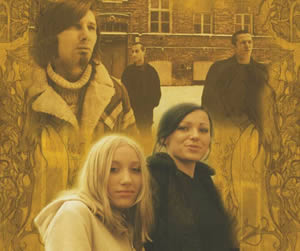 The "New" Turquoise Lineup (2003) |
The central number of the album is the four-part epic "Suita d-minor." A progressive rock masterpiece, the first movement "Tagnal," a short number featuring lush and upbeat 70s style electric guitar and symphonic choir-like keyboards. With that as a short introduction, the rich keyboards and metal-styled electric guitar solos and vast Wakeman-esque keyboard riffs of the second movement, "Zdobede i Ciebie," take over. Strong instrumentally, the piece blends progressive with metal and is evocatively sung by Jacek. Lilia takes over the lead--and indeed her vocal stands out, way above the instrumentals--in the third movement "Glos serca" and the alternating instrumentals instantly soften to lush keyboard and acoustic guitar. The suite concludes with "Testament Sel'entinell," a natural ballad style extension of "Glos serca," again showcasing Lilia's and Agnieszka's vocal work. The evocative violin and acoustic guitar solos within the number are in sharp contrast to the metal edged guitar riffs and regimental percussion in the bridge.
The final portion of the album begins with a harder progressive number entitled "...a smierc utraci wladze swa" with Jacek on lead vocal. Rhythmic guitar and sweeping keyboard passages work well alongside layers of his vocals. Solo work varies between acoustic and electric guitar. The rich choir textures work well in contrast to Jacek's lead. The band's art rock sound returns with Lilia's soaring vocalise illustrating her true virtuousity backed by warm electric guitar and lush keyboard washes in "Po tamtej stronie." A melodic guitar solo precedes Jacek's evocatively performed lead vocal supported by keyboard. The album concludes with "Epilog," a church organ styled keyboard instrumental that bookends the opening number precisely.
Concluding Remarks. It is clear from our reviews above that the Turquoise albums have quickly found a long term spot in our listening rotation. The material is vocally strong and t he vocal work will appeal to our regular visitors. Symphonic and orchestral progressive style instrumentals will certainly appeal to those who follow Yes, You And I, Quidam and Renaissance for example. The albums may require some searching to find online but it is going to be worth it. Interested visitors should try Synphonic (Western United States), ZNR (Eastern United States), GFT (Surrey England) or CD Services (Dundee Scotland). Worth a trans-Atlantic journey, these albums are must listen!
Return to website contents